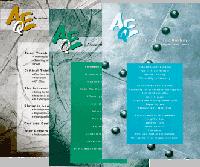Helping Students Get On Course

Academic Exchange Quarterly
The following article was published in the Academic Exchange Quarterly during my tenure with the journal as copy editor. Publication information is listed at the end of the essay.
One of the pleasures of graduation is watching former students walk the aisle to receive their diplomas. As a teacher of developmental English and first year composition courses, I see students as they first begin their college careers. Not all choose to graduate. Some, like my oldest daughter, take courses then transfer to a four-year university. Others are just here to refresh their skills. But even knowing that, I still mark as a measure of my personal success those of my students I see each May in cap and gown.
One student, in particular, made me proud this year. He graduated magna cum laude from the Civil Engineering department, an honors student, having received several academic achievement awards. He was in my EN081 class a few summers back. He came to class with several grammar demons and a lack of faith in his own ability despite some obvious talent. But he was a hard working student, and as the semester wore on, and he saw successes in his writing, he improved and developed, and at the end of the semester, I recommended him to the honors program where he excelled as one of the outstanding students in that program.
Academic achievement often depends on more than just native ability. More often it depends on social and personal skills, on belief in one's self, on faith. As teachers, we can be the catalyst for student success.
In May 1997, I had the privilege of attending the On Course Workshop, a student success workshop led by Skip Downing, author of On Course: Strategies for Creating Success in College and in Life (Houghton Mifflin). During four days at the scenic Bon Secours Retreat Center in Marriottsville, MD, just outside Baltimore, a group of eighteen of us--faculty, counselors, and support staff--engaged in a variety of activities aimed at identifying primary domains of influence and key strategies for encouraging student success and achievement. Held each summer, from late May until early August, these workshops are of benefit to any educator interested in practical efforts to empower students for success. Attendees can even earn graduate credit for participating.
In addition to his text for college success classes (which the authors of "Creating a First Year Seminar in Business" in this issue of AEQ adapt for their program), Downing also moderates a listserv where educators can share successful strategies or discuss problems, and a website with access to numerous student success strategies arranged topically. Currently, more than 1,200 college and university educators participate in discussions on the listserv. The On Course Workshop website <http://www.oncourseworkshop.com/> provides information about Downing's textbook, the listserv, the On Course Workshops, and a variety of resources for educators seeking ideas and activities for encouraging and motivating students.
I am forever grateful to the many teachers I have had who, over the years, encouraged me and believed in me. Some have passed on, and I regret that I cannot tell them how much they have meant to me. I only hope that I can pass on to my students the gifts my teachers so generously gave to me.
Bill Stifler
Copy Editor
Chattanooga State Community College
Academic Exchange Quarterly 5.2 (2001).